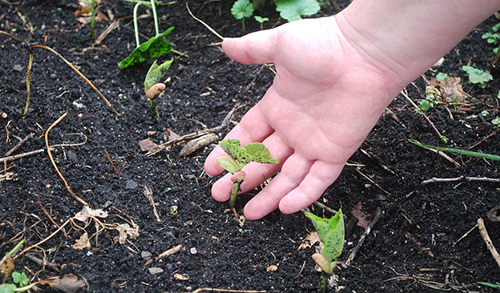Food for your plants
Burpee Edible Gardening Team Members
You’ve started a vegetable garden to grow your own food. But did you know your plants require food of their own before they can reach their full potential? Applying plant fertilizer is sometimes a step that gets skipped by new gardeners. We get so caught up with plant choice, the right soil, and pretty containers and watering cans that we forget this essential part of producing healthy plants.
Providing a good dose of plant food for your vegetables (and flowers!) will help your plants grow strong. Here’s some tips on garden fertilizer.

By The Numbers
20-20-20 ... 18-18-21 ... 10-4-3 ... 3-1-1 What do those numbers mean? It’s called a fertilizer analysis, which indicates the ratio of Nitrogen (N), Phosphorous (P) and Potassium (K) within the plant food. Manufacturers have different formulas: Some specially for tomatoes, some as “bloom boosters”, some listed organic, etc. But any good commercial brand should provide the nutrients needed for proper plant health. Most gardeners will be successful with a packaged all-purpose vegetable fertilizer.
Follow The Label
Granular plant food (or “shake-and-feed”) is a slow-release option. It is sprinkled into your planting hole at transplant or worked gently into the soil around your garden. These are usually applied once a month before fruiting. Liquid or water soluble fertilizers are either added to your watering can in appropriate doses, or hooked onto your hose for mass feeding. This type of plant food should be applied at every other watering, as it doesn’t last in the soil and can be leached out of containers with frequent waterings.
NOTE: Always follow the label for specific application instructions. It will tell you the rates to use for your square footage and/or watering can volume. Over-applying fertilizer can lead to burned leaves or roots, or produce massive foliage plants but no flowers or fruit (e.g., beans, tomatoes, cucumber, etc.)
Amend With Organics
If you prefer a more natural approach to plant nutrition, a healthy dose of compost can go a long way. (Listen to our “Adding Organics” podcast here.) Compost is layers of decaying organic matter, usually consisting of kitchen, home and yard scraps, which breaks down naturally by beneficial bacteria and microorganisms. Making your own compost and adding it to your garden as a soil conditioner will encourage plant growth, protect them from certain diseases, and even buffers toxins in the soil. More on starting a compost pile here.
One Last Tip
Try to feed your plants in the early morning, early evening, or on a cloudy day. These are times when water is absorbed more slowly into the soil so your plants receive more nutrients.
Tell us how using plant food or compost has made you successful! Comment in the section below or connect with fellow gardeners on Facebook.